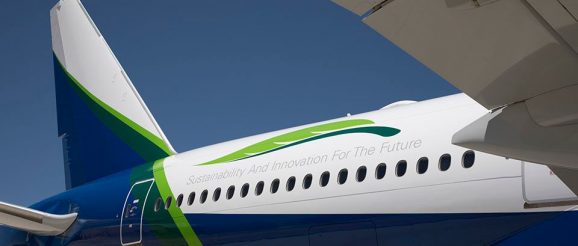SAF Drive: Boeing Becomes Founding Member Of UK Innovation Center

Boeing is gearing up to become a leading force in the development of sustainable aviation fuel (SAF) by becoming a founding member of a research center in the UK. The US planemaker has a significant presence in the United Kingdom, and its latest involvement is another one of its key partnerships in the region, this time giving it access to a one-of-its-kind research facility to help make aviation more sustainable.
Boeing to help develop SAF
A key announcement at this year’s Farnborough Airshow has come from Boeing, which has become the founding member of the University of Sheffield’s Energy Innovation Centre (EIC), which is expected to help drive the development of SAF.
Brian Moran, Boeing’s vice president of Global Sustainability Policy and Partnerships, commented,
“In order for the aviation industry to meet its net zero carbon emissions commitment by 2050 it will take all of us collaborating and investing in scientific research and testing. We are honoured to partner with the University of Sheffield on the UK’s first major SAF hub, which highlights our global commitment to developing SAF as a safe, proven, near-term solution to decarbonise aviation.”
The EIC includes the Sustainable Aviation Fuels Innovation Centre (SAF-IC), a unique facility in the UK set up to test and certify new sustainable aviation fuels (SAF). It also has the Translational Energy Research Centre (TERC), which will contain pilot-scale production facilities suitable for investigating different methods of producing SAF.
Long history in South Yorkshire
This isn’t Boeing’s first partnership in the region. The EIC is situated in the University of Sheffield Innovation District, which also houses the Advanced Manufacturing Research Centre (AMRC). Boeing founded the AMRC with the university in 2001, and today, it supports more than 500 jobs and contributes more than £55 million to the South Yorkshire economy each year. Boeing Sheffield, the company’s first factory in Europe, is an outgrowth of Boeing’s partnership with the AMRC.
Sir Martin Donnelly, president of Boeing Europe and managing director of Boeing in the UK and Ireland, said that this is an opportunity to build upon Boeing’s existing partnerships with Sheffield and to build new ones, while also working toward a more sustainable future for aviation.
Partnership to accelerate SAF development
Many believe that SAF has the potential to decarbonize aviation over the next 20 to 30 years. Such fuel reduces CO2 emissions by as much as 80% over its lifecycle, with the potential to reach 100% in the future. SAF can be blended by up to 50% with traditional jet fuel without modifications to airplanes, engines, or fueling infrastructure. Boeing has committed to delivering its commercial airplanes capable and certified to fly on 100% SAF by 2030.
The EIC is funded, in part, by the Department for Business, Energy, and Industrial Strategy’s Energy Innovation Programme and is backed by £7 million of government funding.
Simple Flying is at the Farnborough Airshow this week. For all the latest news from the show, click here!
Its members will have access to a platform to test and develop new technology on a cost-effective basis before investing in commercial-scale testing or production. The membership program is open to other industrial partners as well, irrespective of any size, from SMEs to multinational corporations.
What do you think about Boeing’s involvement in SAF development? Please let us know in the comment section below.
